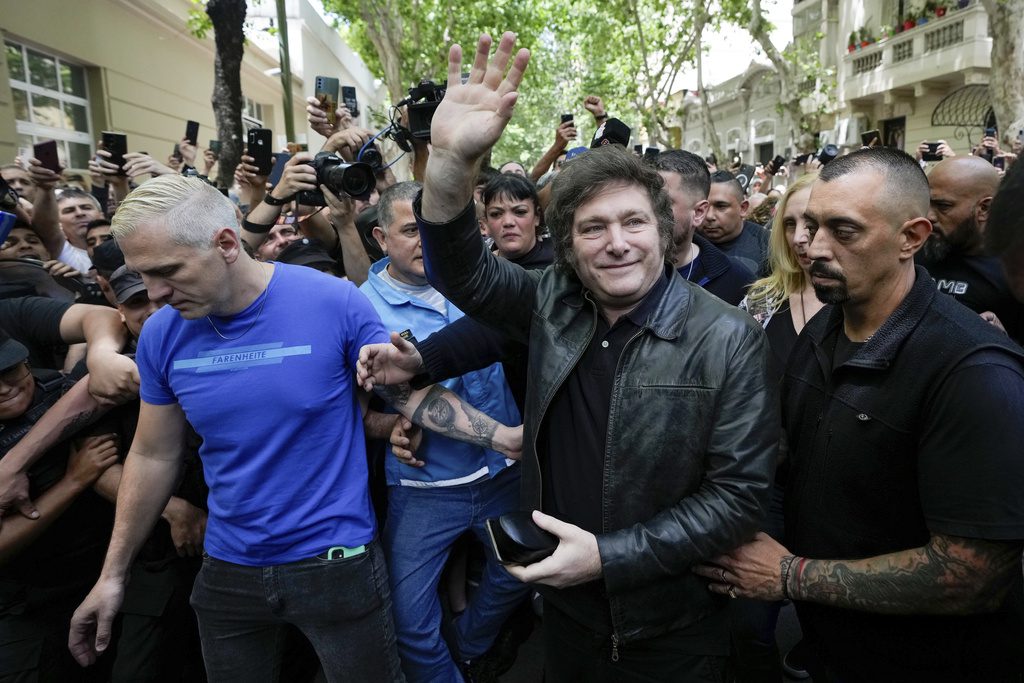Argentina’s Economy Minister Sergio Massa conceded defeat to populist Javier Milei in Sunday’s fiercely polarized presidential runoff even before the country’s electoral authority released official results.
Massa congratulated his opponent, a right-wing economist who has promised a dramatic shake-up for many of the nation’s institutions and welcomed frequent comparisons of him to former U.S. President Donald Trump.
Immediately after Massa’s concession speech, the Argentine electoral authority released partial results: With 86.6% of votes tallied, Milei had 55.95% and Massa 44.04%.
With a Milei victory, the country will swing to the right amid discontent over soaring inflation and rising poverty, and empower a freshman lawmaker who describes himself as an anarcho-capitalist and got his start as a television talking head blasting what he called the “political caste.”
Inflation has soared above 140% and poverty has worsened while Massa has held his post. Milei, a self-described anarcho-capitalist, has proposed to slash the size of the state and rein in inflation, while the government minister he was running against warned people about the negative impacts of such policies. The election forced many to decide which of the two they considered to be the least bad choice.
Milei’s screeds resonated widely with Argentines angered by their struggle to make ends meet, particularly young men.
“Money covers less and less each day. I’m a qualified individual, and my salary isn’t enough for anything,” Esteban Medina, a 26-year-old physical therapist from Ezeiza, on the outskirts of Buenos Aires, told The Associated Press on the sidelines of a Milei rally earlier this week.
Massa, as one of the most prominent figures in a deeply unpopular administration, was once seen as having little chance of victory. But he managed to mobilize the networks of his Peronist party and clinched a decisive first-place finish in the first round of voting.
His campaign cautioned Argentines that his libertarian opponent’s plan to eliminate key ministries and otherwise sharply curtail the state would threaten public services, including health and education, and welfare programs many rely on. Massa also drew attention to his opponent’s often aggressive rhetoric and openly questioned his mental acuity; ahead of the first round, Milei sometimes carried a revving chainsaw at rallies.
Speaking after casting her vote at the stately University of Buenos Aires Law School, Jenifer Pio, 36, told the AP that she fears a Milei victory would risk the return of dictatorship.
“Milei doesn’t have the faintest idea of how to govern,” said Pio, a homemaker. “It isn’t bad that he’s prideful, but he would need to have a bit more stability. He’s unstable emotionally and psychologically. He’s unwell.”
Ana Iparraguirre, a partner at pollster GBAO Strategies, said Massa’s “only chance to win this election when people want change … is to make this election a referendum on whether Milei is fit to be president or not.”
“We’re starting a new chapter in Argentina, and this chapter requires not only goodwill, intelligence and capability but above all, dialogue and the necessary consensus for our homeland to traverse a much more virtuous path in the future,” Massa told journalists Sunday after casting his ballot.
Milei accused Massa and his allies of running a “campaign of fear” and he walked back some of his most controversial proposals, such as loosening gun control. In his final campaign ad, Milei looks at the camera and assures voters he has no plans to privatize education or health care.
“We did a great job despite the fear campaign and all the dirty tactics they used against us,” Milei told journalists after he voted amid a large security operation as dozens of supporters and journalists gathered at his polling place.
One of his supporters is María Gabriela Gaviola, a 63-year-old entrepreneur doing everything she can to avoid shuttering her company, which manufactures veterinary products, amid surging prices for materials. And the government hasn’t helped, including Massa who has held his ministerial post for over a year.
“The productive sector of this country isn’t considered. How long can a country that doesn’t produce be OK?” said Gaviola, who has taken on two side jobs to keep her company afloat. “Truth is, I don’t know Milei. I’ve heard him a bit. I don’t know him, but the one who I already know doesn’t help me. I prefer to try something new.”
Most pre-election polls, which have been notoriously wrong at every step of this year’s campaign, showed a statistical tie between the two candidates. Voters for first-round candidates who didn’t make the runoff will be key. Patricia Bullrich, who placed third, has endorsed Milei.
Underscoring the bitter division this campaign has brought to the fore, Milei received both jeers and cheers on Friday night at the legendary Colón Theater in Buenos Aires.
Those divisions were also evident Sunday when Milei’s running mate, Victoria Villaruel, went to vote and was met by protesters angry at her claims that the number of victims from Argentina’s bloody 1976-1983 military dictatorship is far below what human rights organizations have long claimed, among other controversial positions.
The vote took place amid Milei’s allegations of possible electoral fraud, reminiscent of those from Trump and former Brazilian President Jair Bolsonaro. Without providing evidence, Milei claimed that the first round of the presidential election was plagued by irregularities that affected the result. Experts say such irregularities cannot swing an election, and that his assertions were partly aimed at firing up his base and motivating his supporters to become monitors of voting stations.
Such claims spread widely on social media and, at Milei’s rally in Ezeiza earlier this week, all those interviewed told the AP they were concerned about the integrity of the vote.


